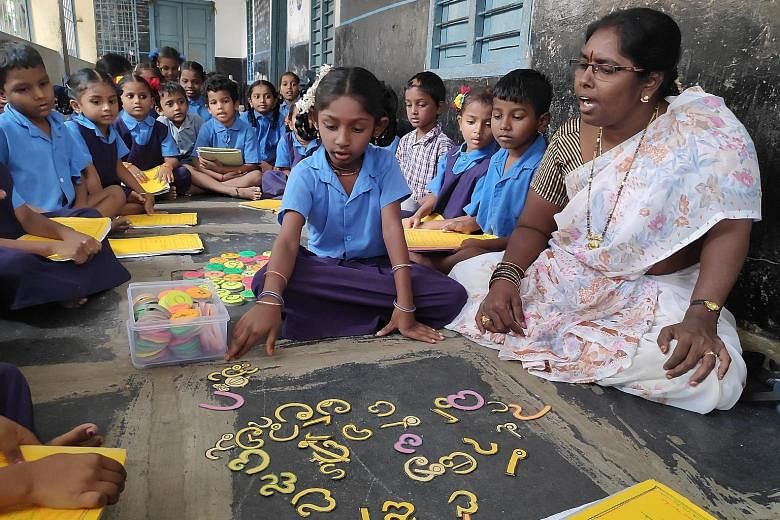When Vijaya learnt to write the English words "boy", "girl" and "teacher" in the third grade, her parents were ecstatic. Her mother, a domestic worker, had never gone to school, while her father, a vegetable vendor, could read only Telugu, their mother tongue and the language spoken in the state of Andhra Pradesh, where they live.
Vijaya's neat, careful English writing gives them visions of her as an engineer. But her teacher said: "She can write in English, but she still thinks in Telugu. There's a clash."
Such language tussles are set to intensify in Andhra Pradesh as the south Indian state plans to convert all its government-run schools into "English medium" overnight. This means schools like Vijaya's, where the medium of instruction is Telugu, will have to switch to teaching mathematics, science and history in English from next year.
"English is a passport to the world," said Mr Adimulapu Suresh, the state education minister. "We want to equip our kids with 21st century skills and make them industry-ready."
He said the move would impact seven million children, and was especially aimed at "giving the deprived classes a shot at competing globally".
In the first phase starting next month, pupils in Grades 1 to 6 in over 45,000 elementary government schools will be taught in English. More than 68,000 teachers will be trained in English, and existing textbooks translated. In 2021-2022, the programme will be extended to Grade 10.
The shift to English is part of the Andhra Pradesh government's nine-point education policy, which ranges from removing rural-urban disparity to incentivising enrolments to building playgrounds and toilets in schools.
The state allotted 330 billion rupees (S$6.3 billion) for education this year - a huge 16 per cent of the annual budget. Of this, 120 billion rupees is earmarked for English learning.
The move marks a major shift in the three-language policy prevalent across India: schoolchildren learn Hindi, English and the regional language. But over the past few decades, one of the three has become most attractive.
"English is an obsession in our region today," said Mr Suresh, crediting this to the information technology boom and massive migration of Telugu-speaking youth to the West. While 80 per cent of children in privately-run schools are exposed to English in the state, only 33 per cent have access to it in government schools.
By offering free English education in government schools, the state hopes to meet people's aspirations and draw them away from unaffordable private schooling.
Parents seem thrilled. "I love Telugu but it will take my daughter nowhere in life. Forget doctor, engineer; these days you need English to get even a job as a salesgirl," said Ms Ayesha Siddik, a janitor in Enikepadu in rural Vijayawada.
Mandal Education Officer for Vijayawada Rural A. Venkatratnam said that the poorest students attended government schools. "If fluent in English, they'll be able to pull their families out of poverty," he said.
Activists who represent the Dalits, or the so-called lower castes, said the discrimination between English-and Telugu-medium students had created insurmountable social and economic hierarchies. "Learning English will uplift the downtrodden," said Centre for Dalit Studies chairman Mallepalli Lakshmaiah.
But opposition leaders claim the policy is the death knell for Telugu.
Giving the assurance that Telugu would remain a compulsory language, the education minister shot back at critics: "Aren't the grandchildren and children of opposition politicians studying in English-medium schools? Why is it the responsibility of the children of depressed classes to carry the burden of Telugu protection?"
Many education experts, however, argue that the policy would spell disaster in a broader sense.
Scholar G.N. Devy, who conducts the People's Linguistic Survey of India, a nationwide survey of the country's living languages, said that an English-medium education created a psyche that made children indifferent to their mother tongue, and alienated them from the social fabric.
"You'll see that Indians who speak more English are quite indifferent about voting in elections, about social nuances and interacting with their local reality. India will pay a cultural, social and political price if we go down this route," he said.
Mr Dhir Jhigran, founder of Delhi-based education non-profit Language and Learning Foundation, said that the "overwhelming evidence from across the world" proved that the mother tongue is the best medium of instruction for young children.
"If we want to prepare our kids for the 21st century, not just in English but also in crucial skills like concept formation and argumentation, the worst thing to do is to start English medium in Grade 1," he said . He suggested introducing oral English lessons and gradually increasing the exposure by middle school, "otherwise this generation won't be able to express themselves well in any language".
Ms Aruna Sri, an English-trained tutor in Enikepadu school which converted Grades 1 and 2 to English-medium instruction two years ago, observed that children learnt English by rote and wrote prepared lessons, but their monthly evaluation showed they could not apply many concepts. "Maybe (the kids' lack of ability) is my mistake, I accept," she said in broken English as she encouraged a Grade 2 pupil to recite the multiplication tables in English. "We all want the best for our children but, hopefully, they won't be left worse off than before."

